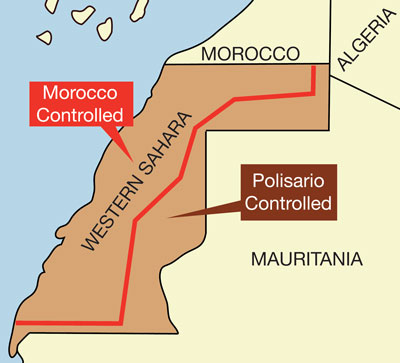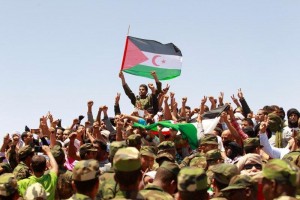Middle East Monitor
Ali Anouzla
This issue will not be solved unless a solution to the problem of democracy in the region can be found.
In a unilateral move, Morocco has decided to withdraw from the Alkrkrat Sahara region, fuelling a conflict that was already on the verge of eruption in the area.
For those who do not know the geography of the region, Alkrkrat is a buffer zone between the southern border of the Sahara region and the northern border of Mauritania. It lies directly behind the sand barrier built by Morocco at the end of the 1980s to protect the cities in the Sahara from attacks by Polisario fighters. It is the longest military security fence in the world. The Moroccan army built the fence to protect the cities (and villages) of the Sahara region that were under Moroccan administration from attacks by the Polisario.
The Moroccan Army left a buffer area between the area and Algeria to the east, and between the area and Mauritania to the south, in order to avoid any friction with its two neighbours during its pursuit of fighters who used these two countries as a rear base to launch attacks against Moroccan troops. Polisario camps are still found in southern Algeria in the Tindouf area.
Morocco’s decision is judicious given that the area it has decided to withdraw from was considered a “buffer zone” and is nicknamed “Switzerland” by smugglers due to the absence of any government authority in the area. A small strip separates the last Moroccan customs point in the Saharan region and the first customs point on northern Mauritanian soil. Thus, the Moroccan decision to “retreat” is a political and a symbolic one, intended to send a message to the new UN Secretary-General, Antonio Guterres, that the Moroccan state is extending a hand of cooperation to the UN, under the leadership of the new Secretary-General, to find a solution to the oldest conflict on the continent.
On the other side, the Polisario Front celebrated what it considered its “military victory”, exploiting it as positive publicity, particularly as this is the first major development to take place under its new leadership after the death of its former leader, Mohamed Abdelaziz. The group is facing a real test of its continued adherence to its project to establish a “Sahrawi state” in the region.
However, what it is now called the “Alkrkrat conflict” is only an echo of a diplomatic battle taking place within the corridors of the African Union, which Morocco recently rejoined more than 32 years after leaving. By sending its forces to an area considered to be an “isolated” zone, Morocco is seeking to confirm its “sovereignty” over the Sahara region, thus considering the region’s borders part of its own territory. This is in full conformity with the African Union’s Charter, which considers that the borders of its Member States are “sacred” and unchangeable. The Polisario Front is seeking to display its military force in this buffer zone to remind the African Union’s members of its struggle with Morocco, the “old/new” member of the organisation.
Evidently, this conflict has not been resolved by a war that has lasted for 16 years between the two parties, claiming the lives of many victims on both sides. Given that it will not be resolved by a new war, neither of the parties is seeking to ignite one, even if they pretend to wish to do so. Thus, the natural solution to this chronic conflict that has become a burden on the Maghreb region, from Morocco to Libya, passing through Mauritania, is a return to the negotiating table to engage seriously in finding possible solutions. Such a dialogue cannot be effective without the participation of a key party, Algeria, which hosts the Polisario Front in its territory and has the ability to influence its decisions.
So far, Morocco has put forward a proposal to grant the population of the region self-rule under Moroccan sovereignty, while the Polisario Front, backed by Algeria, is holding onto the right of the “Sahrawi people” to “self-determination”.
Faced with the refusal of each party to alter their position, the conflict has reached an impasse. The victims of this conflict today are the thousands living in tragic conditions in the Polisario camps in southern Algeria, as well as the millions of people in Morocco and Algeria who are paying the billions of dollars a year being spent on arms. Added to these are the millions of residents of the nations of the Maghreb region who are, on a daily basis, paying for the absence of am Arab Maghreb Union able to establish a wider Maghreb market, grant its people dignity and save them from being forced to migrate to the West and beg at its doors. Instead, the conflict has created conditions for the transformation of their countries into fertile ground for the export of immigrants, smugglers, criminals, and terrorists.
As I have written many times before, the primary cause of the Western Sahara issue since the 1970s, before it being an issue between two or three parties, is the absence of democracy in the region, especially in Morocco and Algeria at that time. The continuation of the conflict today is the continuation of this great “deficit ” in democracy that the region still suffers from. The issue will not be solved unless the problem of democracy in the region is solved. But it seems that none of the parties to the conflict or those affected are trying to do this. So the crisis will continue, along with despair until the dawn of democracy shines over the region. But that is still in the distant future.
Translated from Al-Araby Al-Jadid , 1 March, 2017








